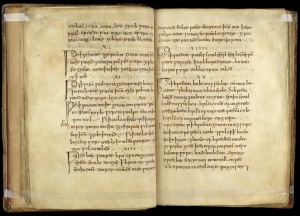I know – it sounds like the title of an Erich von Daniken book; but I’m not about to make fanciful claims about the interstellar origins of civilisation, this is far more interesting because it is based on actual scientific inquiry.
The national health service is prominently in the headlines at the moment while it is used as a political football, with all parties claiming to be its saviour. Rather than point scoring politicians, some of the focus should really be on the incredible work that is done behind the scenes to create the medicines we rely on for our exceptional level of health. No one now remembers a time before antibiotics and how many died from what are now easily curable problems, let alone the physical pain that many people had to simply put up with.
Being able to cure the majority of ailments has for a long time been taken for granted. I am not a student of medicine but before our golden era of medicine it appears that we had to rely on herbs and/or magic, if you were lucky! Otherwise you might have to risk a concoction created by a quack-doctor, simply because you couldn’t afford a real doctor.
Much of what was administered did nothing to cure the problems, and if the patient survived is was more likely due to luck than any form of healing properties of the medicine. Although we can now see how misguided much of medicine used to be we should not dismiss out of hand the endeavors to find cures before modern scientific analysis.
There has long been a snootiness from the scientific community towards what has been termed ‘alternative medicine’, but surely a scientist should be open to alternatives until they are proven or diss-proven. The following example, from the University of Nottingham, is a case in point:- AncientBiotics – A Medieval Remedy for Modern Day Superbugs?  This is the story of a 10th century medical text from the British Library called ‘Bald’s Leechbook‘, which describes a remedy for eye infections, but has found to kill the notorious MRSA superbug. The text reads:-
This is the story of a 10th century medical text from the British Library called ‘Bald’s Leechbook‘, which describes a remedy for eye infections, but has found to kill the notorious MRSA superbug. The text reads:-
“Work and eye salve for a wen, take cropleek and garlic, of both equal quantities, pound them well together, take wine and bullocks gall, of both equal quantities, mix with a leek, put this then into a brazen vessel, let it stand nine days in the brass vessel, wring out through a cloth and clear it well, put it into a horn, and about night-time apply with a feather to the eye; the best leechdom.”
Translated by Dr Christina Lee and tested at the University’s Centre for Biomolecular Sciences by Freya Harrison, a microbiologist, the astonishing antibacterial qualities of this ancient mixture is as efficient (about 90%) as modern antibiotics. The next conundrum is to find out exactly how and why it works!
This is just one example of what may be lost if we do not seriously investigate ancient texts. Yes, much of it probably is nonsense – but what about the knowledge we may lose through our own arrogance, it is all too easy to dismiss the investigations of the ancient world as ignorant fumblings.
We do not know everything and with our over reliance on antibiotics and the increasing resistance to it’s effects, this may be a very good time indeed to investigate the ‘alternatives’ more thoroughly.